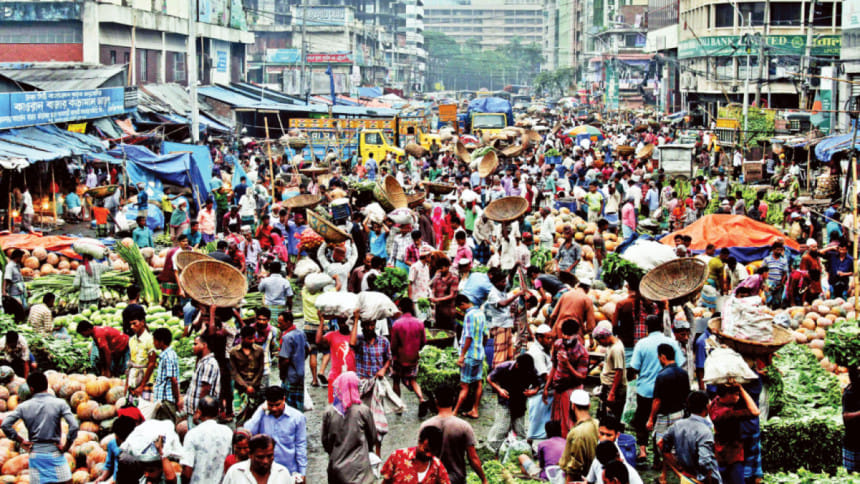Why veggies cost less at Karwan Bazar

Every other day, trader Babul Miah boards a crowded bus from West Shewrapara and heads to Karwan Bazar to buy vegetables for his family.
"It's not convenient to carry seven or eight kilogrammes of vegetables back home by bus," he said.
"But I do it out of necessity. My business hasn't been doing well, and I save around Tk 100 on every Tk 300 purchase by shopping here instead of my neighbourhood market," he added.
Like Babul, many Dhaka residents are turning to Karwan Bazar to stretch their household budgets.
While the market is best known as the city's largest wholesale hub for kitchen essentials, a makeshift retail section springs up along its roads and footpaths every morning, offering vegetables at noticeably lower prices than other kitchen markets across the capital.
The secret behind the affordability lies in timing and proximity. Wholesale trading at Karwan Bazar takes place from midnight to 7:00am. As the wholesale rush winds down, leftover produce, still fresh but unsold, is quickly snapped up by local vendors who set up temporary stalls to serve the early morning crowd.
"Just before the wholesale market closes, traders are eager to offload unsold stock," explained Ashraful Islam, a regular seller in the retail section. "We buy at reduced prices and pass the savings on to our customers."
This practice, combined with zero transport costs and minimal spoilage from storage, enables Karwan Bazar vendors to offer significantly lower prices.
THE PRICE GAP
Recent visits to at least eight kitchen markets, including Mirpur 11, Shewrapara, Kazipara, Farmgate, Ibrahimpur, Kachukhet, and Korail Beltoli Slum, revealed that vegetables at Karwan Bazar's retail section were on average 10–15 percent cheaper. In some cases, the difference was even more pronounced.
For example, eggplants, pointed gourds, okra, long beans, ridge gourds, and papayas were selling for Tk 40–60 per kilogramme at Karwan Bazar, while the same items were priced between Tk 60 and Tk 100 at other city markets.
Potatoes at Karwan Bazar cost just Tk 18–20 per kg, compared to Tk 20–25 elsewhere. Green chilies sold for Tk 70–80 per kg—Tk 10–40 less than prices in other areas.
Despite sourcing their produce from the same wholesale markets -- Karwan Bazar or Mirpur 1 -- vendors in neighbourhood markets say they are compelled to charge more.
"Vegetables are perishable. Around 3 to 5 percent are damaged during storage and transport," said Mohammad Rakib, a seller at Ibrahimpur Market.
"We also pay for staff, rent, and transport. Altogether, that adds about 5 to 15 percent to our costs."
This results in a price difference that's leading more cost-conscious buyers like Babul to bypass local vendors and make the jounrey to Karwan Bazar.
TRADE-OFF BETWEEN COST, CONVINIENCE
While the journey to Karwan Bazar may be inconvenient, many shoppers consider it a worthwhile trade-off. For families navigating rising living costs, those extra savings can make a difference.
"I don't enjoy the crowd or the hassle," Babul added, "but at the end of the day, the money I save helps keep my household running," he said.
Nasima Akter, a domestic worker from Kalabagan, said, "I leave home before sunrise and come here once a week. Even if I save Tk 50 or 60, that means I can buy eggs or pulses with it."
Mohammad Ismail, a private firm employee from Tejgaon, said, "It's not just about saving money. The vegetables here are fresher too. If you come early, you get the best pick."

 For all latest news, follow The Daily Star's Google News channel.
For all latest news, follow The Daily Star's Google News channel. 








Comments